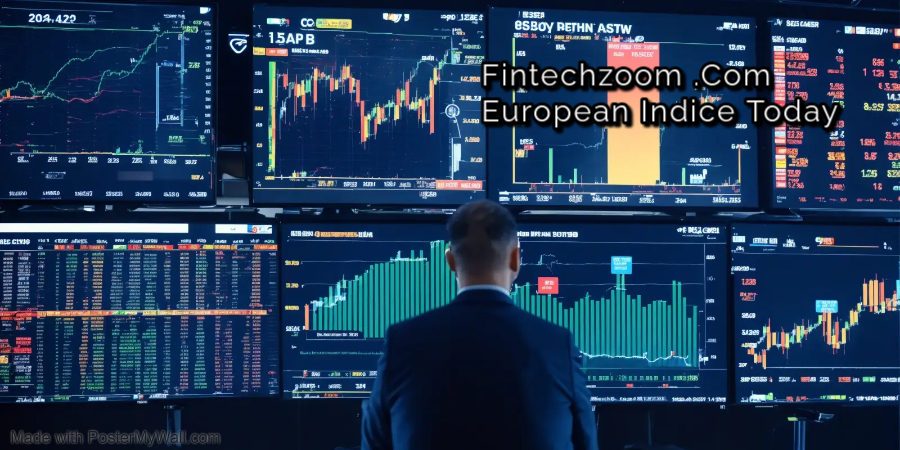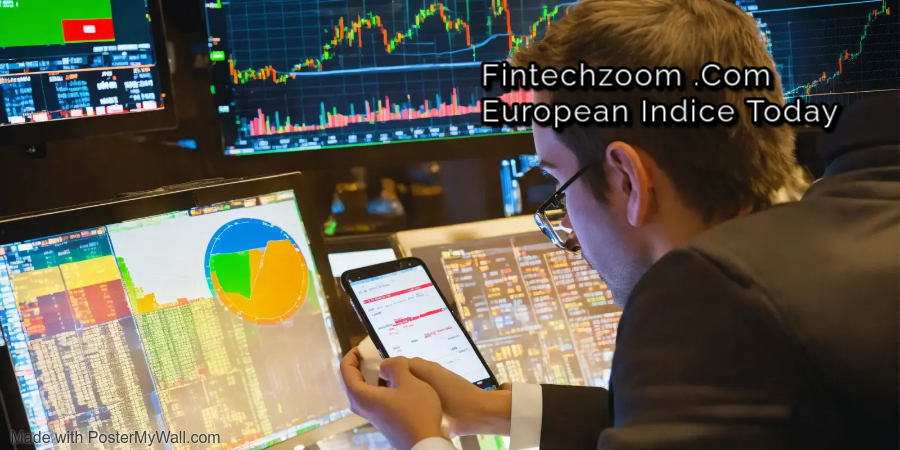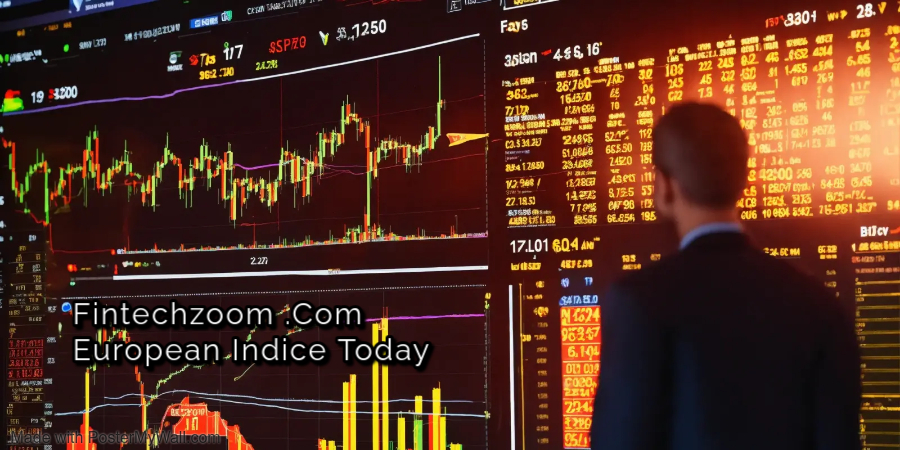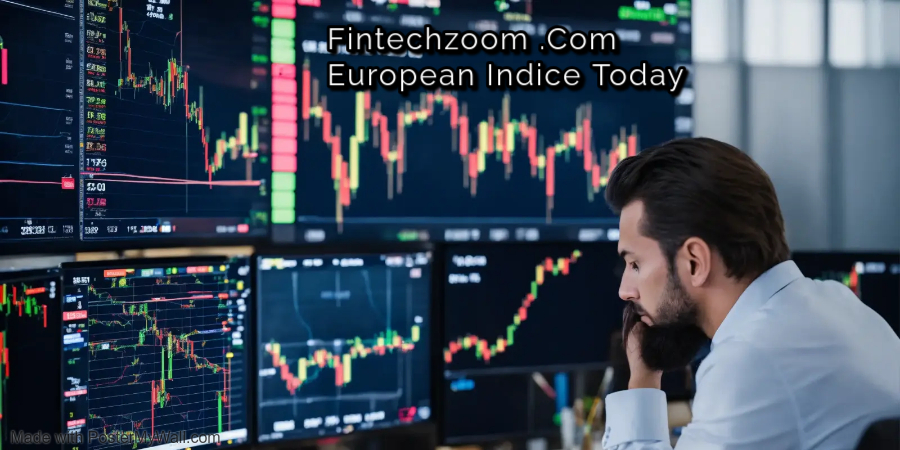Understanding the complexities of Fintechzoom .Com European Indices Today is no small feat, especially in today’s volatile global market. These indices serve as a critical barometer for investors, financial analysts, and stock enthusiasts to gauge the economic health of Europe, offering insights that can influence investment decisions worldwide. With the growing interest in European markets post-COVID recovery, Fintechzoom’s analysis provides a treasure trove of data-driven insights that are indispensable for navigating this evolving landscape.

Understanding European Indices
What Are Stock Indices and How Are They Calculated?
Stock indices are essentially baskets of selected stocks representing various sectors in the economy. They are calculated using a weighted average of the stocks they contain, offering a snapshot of the market’s overall health. The methodology behind calculating these indices can vary, with some using price-weighted methods and others relying on market-capitalization weighting. This distinction plays a crucial role in how these indices react to market changes.
Overview of Major European Indices
European markets are home to several key indices, including the FTSE 100, DAX 40, CAC 40, and Euro Stoxx 50. Each serves as a benchmark for specific segments of the European economy. For instance, the FTSE 100 tracks the top 100 companies on the London Stock Exchange, while the DAX 40 focuses on blue-chip German companies. These indices are pivotal in understanding regional economic dynamics and trends.
Importance of These Indices as Economic Indicators
These indices are not just numbers—they are vital indicators of economic health. They reflect investor confidence, economic stability, and potential growth opportunities. When these indices rise, it often signals economic recovery or growth, whereas a decline could indicate financial instability or economic downturns. Understanding these movements is crucial for making informed investment decisions.
Recent Performance of European Indices
How European Indices Have Performed in the Last 12 Months
Over the past year, European indices have demonstrated resilience amidst global challenges such as inflationary pressures and geopolitical tensions. The FTSE 100 and DAX 40 have shown steady growth, although the path has been marked by volatility. This performance reflects both regional economic recovery efforts and broader global economic conditions.
Key Trends Observed by Fintechzoom
Fintechzoom highlights several significant trends impacting these indices. One notable trend is the increasing investor interest in sustainable investments, driven by Europe’s commitment to green initiatives. Another is the impact of technological advancements on market dynamics, with tech stocks offering unexpected opportunities for growth.
Comparison of European Markets vs. U.S. Markets
In comparison to U.S. markets, European indices have exhibited unique characteristics. While U.S. markets tend to be more volatile and tech-driven, European indices often display more stability, partly due to their diverse economic base. This difference offers distinct opportunities and challenges for investors looking to diversify their portfolios.

The Role of Inflation in European Markets
How Inflation Rates in the EU Impact Stock Performance
Inflation remains a pivotal factor influencing stock performance in Europe. Rising inflation rates can erode purchasing power, leading to shifts in consumer behavior and affecting corporate earnings. European policymakers are grappling with balancing inflation control with economic growth, a challenge that directly impacts stock market dynamics.
Fintechzoom’s View on Inflationary Pressures
According to Fintechzoom, inflationary pressures in Europe are largely driven by energy prices and supply chain disruptions. These factors have created a ripple effect across various sectors, with some companies struggling to maintain profit margins. Fintechzoom suggests that monitoring these inflationary trends is essential for anticipating market movements.
Key Sectors Affected by Rising Inflation in Europe
Several sectors have felt the brunt of rising inflation, particularly those reliant on raw materials and energy. Industries such as manufacturing and consumer goods have faced increased production costs, while energy sectors have experienced both challenges and opportunities as they adapt to shifting market conditions.
Impact of the Russia-Ukraine Conflict on European Markets
How Geopolitical Tensions Have Influenced European Indices
The ongoing Russia-Ukraine conflict has had a profound impact on European markets. Geopolitical tensions have led to fluctuations in energy prices and investor uncertainty, contributing to market volatility. These developments underscore the interconnectedness of global political events and financial markets.
Fintechzoom’s Analysis of Market Volatility
Fintechzoom’s analysis reveals that market volatility has been exacerbated by geopolitical uncertainties. Investors have become more cautious, seeking refuge in safer assets while reassessing riskier investments. This cautious approach is reflected in fluctuating stock prices and shifts in market sentiment.
Long-Term Outlook on Europe’s Geopolitical Landscape
Looking ahead, the geopolitical landscape in Europe will continue to influence market dynamics. While uncertainty remains, opportunities may arise from strategic partnerships and policy shifts. Investors should stay informed about geopolitical developments and their potential impact on market indices.
The Green Transition and Its Effect on European Stocks
How the EU’s Green Deal is Influencing Stock Markets
Europe’s commitment to sustainability, as embodied in the EU’s Green Deal, is reshaping stock markets. This ambitious initiative aims to make Europe climate-neutral by 2050, creating new opportunities for companies involved in renewable energy, clean technology, and environmental innovation.
Sectors Benefiting from Europe’s Move Towards Sustainability
Several sectors stand to benefit from Europe’s green transition. Renewable energy companies are witnessing increased investments, while industries focused on sustainable practices are gaining traction. These trends are driving growth in sectors aligned with environmentally conscious initiatives.
Fintechzoom’s Insights on Growth Opportunities
Fintechzoom identifies renewable energy, electric vehicles, and sustainable agriculture as key growth areas. These sectors are poised to attract investor attention as sustainability becomes a central theme in investment strategies. Companies with innovative solutions are likely to lead the charge in this evolving landscape.
Post-COVID Recovery Opportunities and Risks
Europe’s Economic Rebound and Its Impact on Indices
The post-COVID recovery has propelled Europe’s economic revival, with indices reflecting renewed investor optimism. Government stimulus measures and vaccination efforts have contributed to this rebound, fostering a sense of resilience across various sectors.
Sectors Leading the Recovery According to Fintechzoom
Fintechzoom highlights several sectors driving Europe’s recovery, including technology, healthcare, and consumer goods. These industries have demonstrated adaptability and innovation, positioning themselves as frontrunners in the post-pandemic landscape.
Risks Investors Should Be Aware Of
While opportunities abound, risks persist. Supply chain disruptions, policy uncertainties, and potential COVID-19 resurgences pose challenges. Investors should remain vigilant, staying attuned to evolving market conditions and mitigating risks through diversification.
Key Sectors Driving European Indices
Breakdown of Key Sectors Technology, Energy, Healthcare, and Financials
European indices are powered by a diverse range of sectors, each contributing to market performance. Technology and energy are experiencing rapid growth, while healthcare and financials provide stability and resilience in uncertain times.

Fintechzoom’s Analysis of Sector Contributions
Fintechzoom’s analysis reveals that technology and energy sectors have outperformed expectations, driven by innovation and sustainability trends. Meanwhile, healthcare remains a staple due to its essential nature, and financials provide a foundation for market stability.
Sector Rotation and What to Watch For
Sector rotation is a dynamic process influenced by macroeconomic factors and market sentiment. Investors should monitor shifts in sector performance, as opportunities may arise from changing consumer preferences and technological advancements.
The Role of Central Banks in European Indices
Impact of European Central Bank’s Policies on Market Movements
Central banks wield significant influence over market dynamics through monetary policies. The European Central Bank’s decisions on interest rates and quantitative easing impact investor sentiment and stock performance.
Fintechzoom’s Insights on Interest Rate Changes
Fintechzoom highlights the potential effects of interest rate changes on European stocks. Lower rates may stimulate borrowing and investment, while higher rates could curb inflation but impact corporate earnings.
Monetary Policies Investors Should Be Aware Of
Investors should keep a close eye on monetary policy developments, as they can shape market trends. Understanding central bank actions and their implications is crucial for making informed investment decisions.
European Tech Stocks Underappreciated Growth Opportunities
Fintechzoom’s Analysis of the European Tech Landscape
European tech stocks present intriguing opportunities for growth. Fintechzoom’s analysis highlights the region’s innovative startups and established tech companies capitalizing on digital transformation.
Comparison with U.S. Counterparts
While European tech companies may not enjoy the same scale as their U.S. counterparts, they offer unique advantages. The focus on sustainable technology and niche markets positions them for growth in a rapidly evolving digital landscape.
Potential Investment Opportunities
Investors seeking exposure to tech innovation should consider European stocks. From fintech solutions to green technology, these companies offer compelling opportunities for those looking to capitalize on technological advancements.
Energy Crisis and Its Ripple Effect on European Indices
Impact of Rising Energy Prices on Various Sectors
The energy crisis has reverberated across European markets, impacting sectors reliant on energy-intensive processes. Rising prices have led to increased costs for manufacturing and transportation, affecting profitability.
Fintechzoom’s Insights on Energy Shortages
Fintechzoom’s insights shed light on the far-reaching consequences of energy shortages. Companies are reevaluating supply chains and exploring alternative energy sources to mitigate risk and ensure continuity.
Long-Term Implications of Energy Dependency
Europe’s energy dependency presents both challenges and opportunities. While short-term disruptions persist, the transition to sustainable energy sources holds promise for reducing vulnerability and enhancing resilience.

The Impact of Brexit on European Markets
Effects of Brexit on the UK’s FTSE 100 and Other Indices
Brexit has reshaped the landscape of European markets, with implications for the UK’s FTSE 100 and other indices. Changes in trade relationships and regulatory environments have influenced stock performance.
Fintechzoom’s Take on the Post-Brexit Economic Landscape
Fintechzoom provides valuable insights into the post-Brexit environment, highlighting areas of opportunity and uncertainty. Adapting to new trade dynamics is crucial for businesses seeking to thrive in this evolving landscape.
Future Expectations for UK and European Markets
While challenges remain, Brexit presents opportunities for innovation and growth. Businesses willing to adapt and explore new markets may find success in navigating the complexities of this new economic reality.
Fintechzoom’s Forecast for European Indices
Future Performance Predictions Based on Fintechzoom’s Data
Fintechzoom’s forecasts provide valuable insights into the future performance of European indices. Data-driven analysis reveals anticipated trends and potential growth areas in various sectors.
Key Sectors and Emerging Industries
Emerging industries such as renewable energy, biotech, and digital transformation are poised for growth. Investors should consider these sectors when seeking opportunities to diversify portfolios.
Influence of Global Trends on European Markets
Global trends, including technological advancements and sustainability initiatives, will shape European markets in the coming years. Understanding these trends empowers investors to make informed decisions and capitalize on evolving opportunities.
The Role of Foreign Investment in European Markets
Impact of Foreign Investors on European Stock Indices
Foreign investors play a crucial role in shaping European markets. Their capital injections can drive growth and innovation, influencing stock performance and market trends.
Fintechzoom’s Insights on Foreign Investment Trends
Fintechzoom’s analysis highlights regions with increasing interest in European investments. Asia and North America are notable contributors, with investors seeking diversification and exposure to European growth opportunities.
Long-Term Implications of Increased Foreign Investment
Increased foreign investment contributes to market liquidity and stability. While it presents opportunities for growth, it also requires careful consideration of geopolitical factors and regulatory environments.
Conclusion
In conclusion, European indices today reflect a dynamic and evolving landscape influenced by a myriad of factors, from geopolitical tensions to technological advancements. Fintechzoom’s insights provide valuable guidance for investors, financial analysts, and stock enthusiasts looking to seize opportunities in this vibrant market. Understanding the complexities of European indices and staying informed about emerging trends is crucial for making informed investment decisions. Whether you’re a seasoned investor or a curious tech enthusiast, the European market offers diverse opportunities for growth and innovation.
FAQs
- How do European indices differ from U.S. indices like the S&P 500?
- What are the key sectors driving growth in European markets?
- How has Brexit impacted European indices like the FTSE 100?
- Is the European tech sector a good investment compared to U.S. tech?
- How do inflation rates in Europe affect stock performance?
- Which European countries are leading in sustainable investing?
- What is the role of foreign investment in European indices?
- How do energy shortages in Europe impact the market?
- Should I be concerned about volatility in European stocks?
- What are the best ways to invest in European indices as a U.S. investor?
Future Trends and Considerations for European Markets
Sustainability and ESG Investments
As the global focus shifts towards sustainability, European markets are at the forefront of Environmental, Social, and Governance (ESG) investments. European companies are increasingly adopting sustainable practices, and investors are prioritizing ESG criteria when selecting stocks. This trend presents both challenges and opportunities, as businesses adapt to meet stricter regulations and the growing demand for responsible investment options.
Technological Disruptions and Digital Economies
Technological innovation continues to drive change across European markets. Digital economies are expanding rapidly, with advancements in artificial intelligence, blockchain, and cloud computing transforming traditional business models. European companies are capitalizing on these technologies to improve efficiency, offer new services, and meet the evolving needs of consumers. Investors focusing on tech-enabled sectors may find significant growth opportunities in this dynamic environment.
Geopolitical Factors and Their Market Impact
Geopolitical events and policies continue to play a crucial role in shaping European indices. As countries navigate complex relationships, from trade negotiations to regional conflicts, investors must remain vigilant and agile. Understanding geopolitical risks and their potential impacts is essential for anyone looking to invest in European markets, ensuring they can respond effectively to changes and protect their assets.
Demographic Changes and Consumer Trends
Changing demographics within Europe also influence market dynamics. Aging populations and shifting consumer preferences are reshaping demand across various sectors. Companies that can align their offerings with these trends are likely to achieve greater success. Investors should consider how demographic shifts influence long-term investment strategies, focusing on sectors that cater to emerging consumer needs.
By staying abreast of these future trends and considerations, investors can better navigate the complexities of European markets and identify promising opportunities for growth and innovation.

